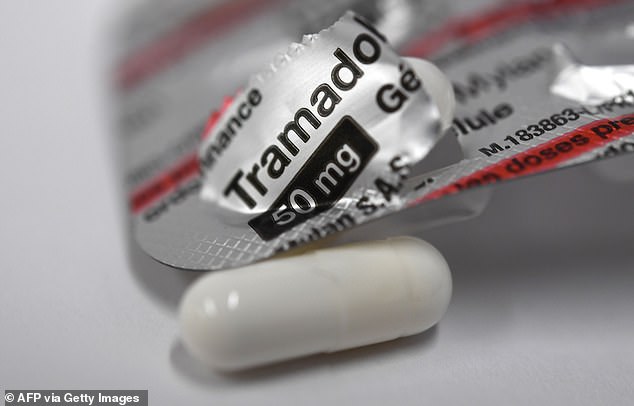Commonly prescribed painkiller tramadol is ‘not that effective’ after all at relieving chronic pain, experts have warned.
Opioids like tramadol, can provide highly effective pain relief when used in the short-term.
But doctors have previously warned that patients waiting months for NHS operations are taking the painkillers for dangerously long periods and finding themselves hooked.
Now, Danish researchers have discovered the drug — which is particularly popular in the US — had a ‘limited’ impact on chronic pain.
The scientists, who analysed the health records of more than 6,500 patients, also found it increased the risk of suffering serious side effects such as heart disease.
Experts today said tramadol’s potential harms ‘likely outweighed’ its ‘limited benefits’.
Publishing their findings in the journal BMJ Evidence Based Medicine, they also argued that ‘tramadol and other opioids should be minimised to the greatest extent possible’.
In the study, the researchers from Rigshospitalet in Copenhagen, assessed the results of 19 clinical trials involving patients with chronic pain.

Opioids like tramadol, can provide highly effective pain relief when used in the short-term. But doctors have previously warned that patients waiting months for NHS operations are taking the painkillers for dangerously long periods
Five trials looked at the impact of tramadol on neuropathic pain, while nine focused on osteoarthritis.
Four, meanwhile, looked at chronic low back pain and one focused on fibromyalgia.
Most people were taking the drug as tablets, and length of treatment ranged from two to 16 weeks.
Pooled data analysis showed that while tramadol eased pain, the effect was small and below what would be considered clinically effective.
Researchers also noted a doubling in the risk of harms associated with tramadol compared with placebo drugs, mainly driven by a higher proportion of things such as chest pain, heart disease and congestive heart failure.
Some patients also suffered nausea, dizziness, constipation and sleepiness.
The researchers concluded: ‘Approximately 60 million individuals worldwide experience the addictive effects of opioids.
‘In 2019, drug use was responsible for approximately 600,000 deaths, with nearly 80 per cent of these fatalities associated with opioids and approximately 25 per cent resulting from opioid overdose.’
Responding to the findings, Professor Kamila Hawthorne, chairwoman of the Royal College of GPs, said: ‘GPs understand how debilitating chronic pain can be and the serious impact it can have on the lives of our patients.
‘GPs in the UK have been advised to limit, reduce and preferably stop tramadol prescribing for chronic pain and not to start tramadol for new patients with this condition.
‘Treating chronic pain can often be challenging given the underlying reason for the pain is often unclear, making it hard to target treatment.
‘As with any condition, GPs will consider the various physical, psychological, and social factors potentially impacting on a patient’s health when coming up with a treatment plan, in conversation with them.
‘Part of this process will also involve exploring non-pharmaceutical options to supporting patients manage their pain, but access to interventions that could help, such as pain clinics, is often patchy across the country.’
It comes research last year found that the NHS had dished out almost £1billion-worth of addictive opioid painkillers over five years.
According to figures collected by Oxford University’s OpenPrescribing.net, the health service doled out £90.1million of the drugs in 2019, rising to £186.2million last year and a projected £189million in 2024.
The Royal College of Surgeons has also warned that hundred of thousands of patients are ‘continuing to live in pain on waiting lists’.
And many are reliant on powerful drugs to get by, leaving them at risk of developing an addiction that continues even after their operation.
This article was originally published by a www.dailymail.co.uk . Read the Original article here. .

